Serving 423 students in grades Prekindergarten-5, Lowell Elementary - 28 ranks in the bottom 50% of all schools in South Dakota for overall test scores (math proficiency is bottom 50%, and reading proficiency is bottom 50%).
The percentage of students achieving proficiency in math is 30-34% (which is lower than the South Dakota state average of 42%). The percentage of students achieving proficiency in reading/language arts is 35-39% (which is lower than the South Dakota state average of 51%).
The student:teacher ratio of 13:1 is higher than the South Dakota state level of 12:1.
Minority enrollment is 70% of the student body (majority Hispanic and Black), which is higher than the South Dakota state average of 33% (majority American Indian and Hispanic).
Quick Stats (2025)
- Grades: Prekindergarten-5
- Enrollment: 423 students
- Student:Teacher Ratio: 13:1
- Minority Enrollment: 70%
- Overall Testing Rank: Bottom 50% in SD
- Math Proficiency: 30-34% (Btm 50%)
- Reading Proficiency: 35-39% (Btm 50%)
- Science Proficiency: 20-24% (Btm 50%)
- Source: National Center for Education Statistics (NCES), SD Dept. of Education
Top Rankings
Lowell Elementary - 28 ranks among the top 20% of public schools in South Dakota for:
Category
Attribute
Diversity
Percent Eligible For Free Lunch
School Overview
Lowell Elementary - 28's student population of 423 students has declined by 10% over five school years.
The teacher population of 32 teachers has grown by 6% over five school years.
Grades Offered
Grades Prekindergarten-5
Total Students
423 students
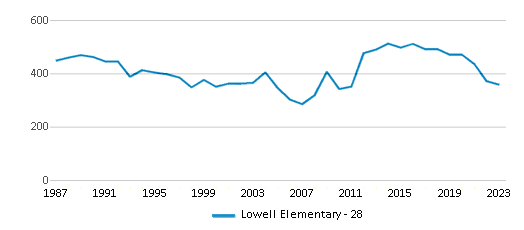
Gender %
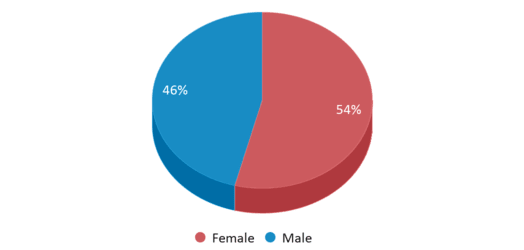
Total Classroom Teachers
32 teachers
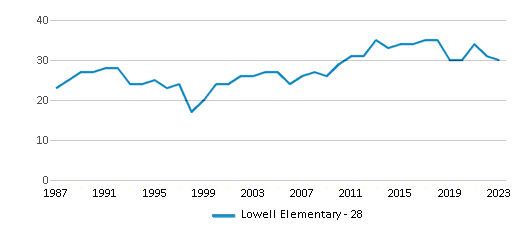
Students by Grade
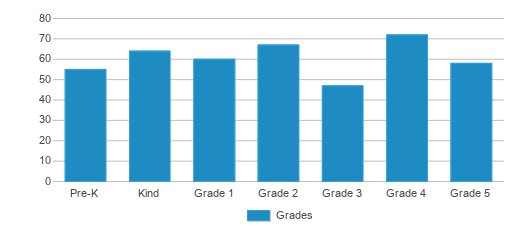
School Rankings
Lowell Elementary - 28 ranks within the bottom 50% of all 636 schools in South Dakota (based off of combined math and reading proficiency testing data).
The diversity score of Lowell Elementary - 28 is 0.79, which is more than the diversity score at state average of 0.53. The school's diversity has stayed relatively flat over five school years.
Overall Testing Rank
#523 out of 636 schools
(Bottom 50%)
(Bottom 50%)
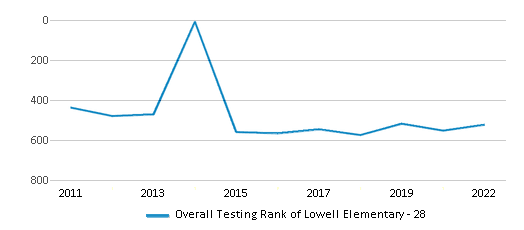
Math Test Scores (% Proficient)
30-34%
42%
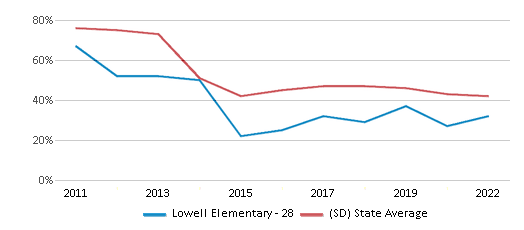
Reading/Language Arts Test Scores (% Proficient)
35-39%
51%
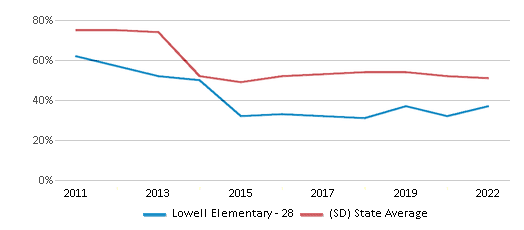
Science Test Scores (% Proficient)
20-24%
42%
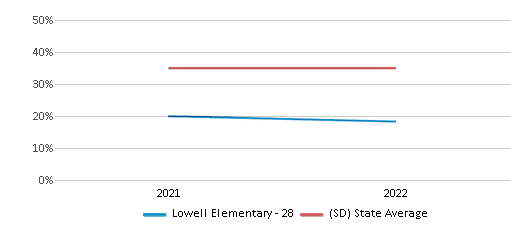
Student : Teacher Ratio
13:1
12:1
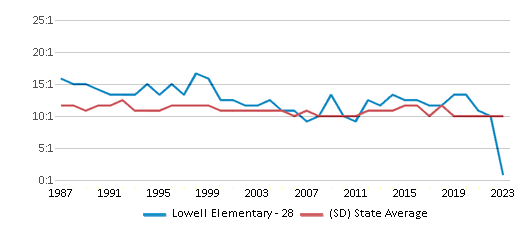
American Indian
10%
14%
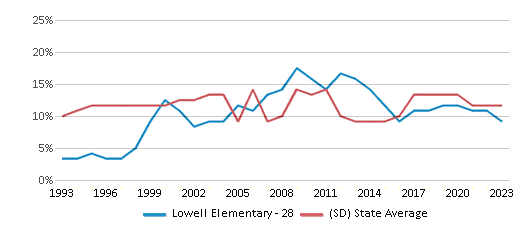
Asian
2%
2%
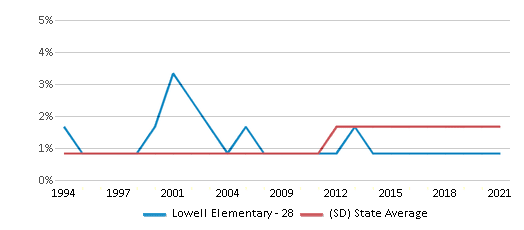
Hispanic
28%
8%
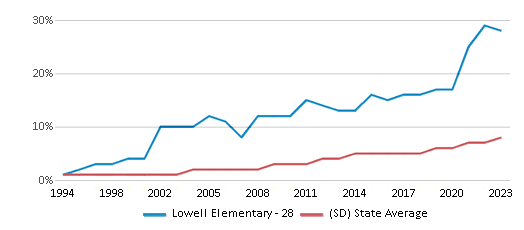
Black
16%
3%
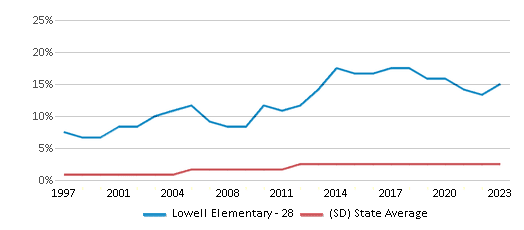
White
30%
67%
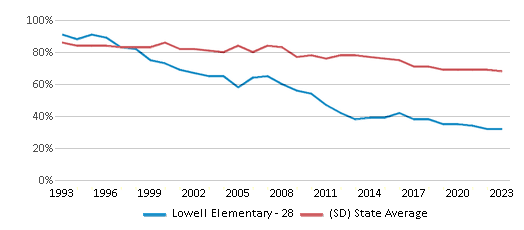
Hawaiian
1%
n/a
Two or more races
13%
6%
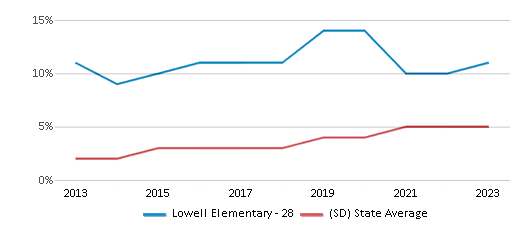
All Ethnic Groups
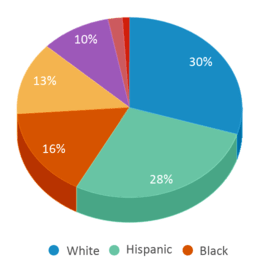
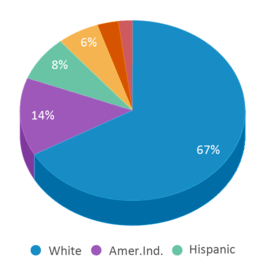
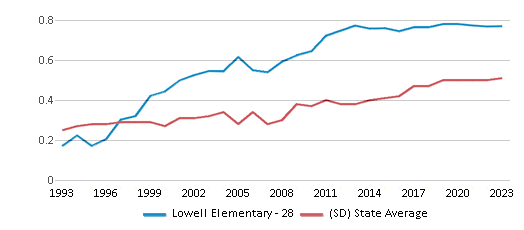
Participates in the National School Lunch Program (NSLP)
Yes
Eligible for Free Lunch
62%
31%
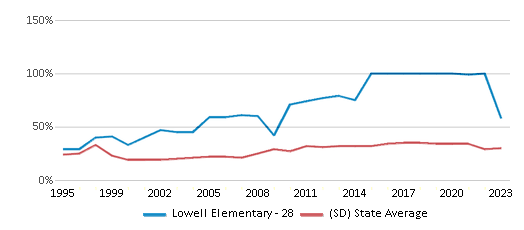
Eligible for Reduced Lunch
16%
6%
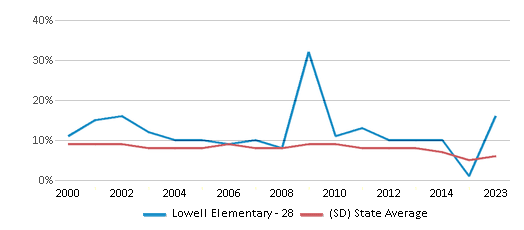
School Statewide Testing
School District Name
Source: National Center for Education Statistics (NCES), SD Dept. of Education
Profile last updated: 02/09/2025
Frequently Asked Questions
What is Lowell Elementary - 28's ranking?
Lowell Elementary - 28 is ranked #523 out of 636 schools, which ranks it among the bottom 50% of public schools in South Dakota.
What schools are Lowell Elementary - 28 often compared to?
Lowell Elementary - 28is often viewed alongside schools like Cleveland Elementary - 14 by visitors of our site.
What percent of students have achieved state testing proficiency in math and reading?
30-34% of students have achieved math proficiency (compared to the 42% SD state average), while 35-39% of students have achieved reading proficiency (compared to the 51% SD state average).
How many students attend Lowell Elementary - 28?
423 students attend Lowell Elementary - 28.
What is the racial composition of the student body?
30% of Lowell Elementary - 28 students are White, 28% of students are Hispanic, 16% of students are Black, 13% of students are Two or more races, 10% of students are American Indian, 2% of students are Asian, and 1% of students are Hawaiian.
What is the student:teacher ratio of Lowell Elementary - 28?
Lowell Elementary - 28 has a student ration of 13:1, which is higher than the South Dakota state average of 12:1.
What grades does Lowell Elementary - 28 offer ?
Lowell Elementary - 28 offers enrollment in grades Prekindergarten-5
What school district is Lowell Elementary - 28 part of?
Lowell Elementary - 28 is part of Sioux Falls School District 49-5.
School Reviews
5 5/19/2022
My oldest is now seven and has been in the amazing care of Lowell staff for three years now - pre-K through now at the end of 1st grade. When my family moved here from out of state, my husband''s coworkers all recommended schools - all recommendations were private schools in the ($$$$$) O''Gorman system. I was shocked that none of the public schools got kudos from the local community when we asked around. After one full year of watching our bubbly, kind, outgoing child shrink into a shell of himself at St Michael''s, I knew we needed a big change. Lowell was it- and by golly, within weeks of the next school year, our sweet little love''s fire was back in his eyes - and it still makes me cry with gratitude when I remember how much they''ve helped him grow. The way the Lowell family works to support students as a whole is simply beyond words. I am thrilled and thankful that our 2nd little love will be starting kindergarten there in the fall, finally getting to be a Bulldog like his big brother.
5 8/14/2014
Lowell has an active Cub Scout program. It is open to all boys, first through fifth grades. Cub Scouts meet on the first, third and fourth Thursdays of each month during the school year. Meetings are held at 6:30 pm in the Cafeteria. Hope to see you there!
Review Lowell Elementary - 28. Reviews should be a few sentences in length. Please include any comments on:
- Quality of academic programs, teachers, and facilities
- Availability of music, art, sports and other extracurricular activities
Recent Articles

What Is A Charter School?
Explore the world of charter schools in this comprehensive guide. Learn about their history, how they operate, and the pros and cons of this educational innovation. Discover key facts about charter schools, including admission policies, demographics, and funding, as well as what to look for when considering a charter school for your child.

10 Reasons Why High School Sports Benefit Students
Discover the 10 compelling reasons why high school sports are beneficial for students. This comprehensive article explores how athletics enhance academic performance, foster personal growth, and develop crucial life skills. From improved fitness and time management to leadership development and community representation, learn why participating in high school sports can be a game-changer for students' overall success and well-being.

February 05, 2025
Understanding the U.S. Department of Education: Structure, Impact, and EvolutionWe explore how the Department of Education shapes American education, from its cabinet-level leadership to its impact on millions of students, written for general audiences seeking clarity on this vital institution.





